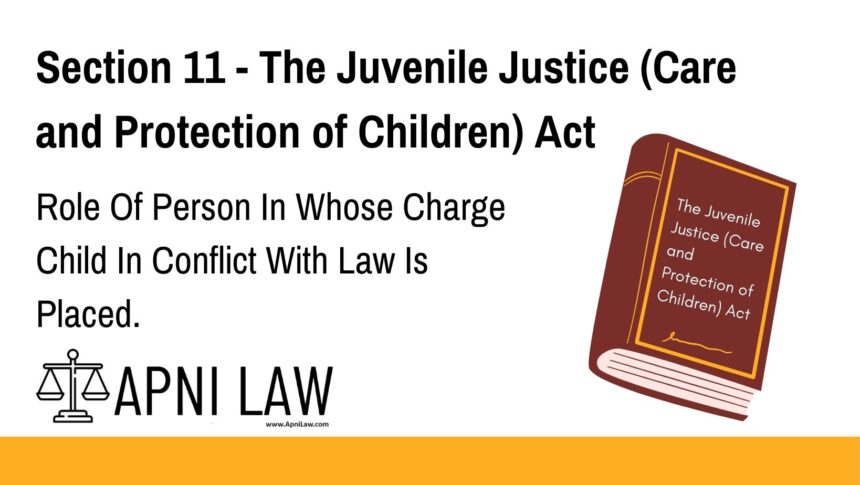Code
Any person in whose
charge a child in conflict with law is placed, shall while the order is in force, have responsibility of the
said child, as if the said person was the child parent and responsible for the child maintenance :Provided that the child shall continue in such persons charge for the period stated by the Board,
notwithstanding that the said child is claimed by the parents or any other person except when the Board is
of the opinion that the parent or any other person are fit to exercise charge over such child. Section 11 – The Juvenile Justice
Explanation
Section 11 of the Juvenile Justice Act establishes the legal framework for the care and responsibility of a child in conflict with law. When the Juvenile Justice Board places a child under someone’s charge—whether a guardian, social worker, or institution—that person assumes legal responsibility for the child as if they were the child’s natural parent.
The law prioritizes the child’s welfare and continuity of care. Even if biological parents or others later seek custody, the child shall remain with the designated caretaker unless the Board is satisfied that the parents or claimants are capable of providing proper care.
Illustration
Example 1: Custody in a Shelter Home
A 15-year-old boy involved in petty theft is placed in a shelter home by the Board. The shelter manager assumes full responsibility for his welfare, including food, education, and discipline, just like a parent. The parents cannot claim him back unless the Board is convinced they can take proper care of him.
Example 2: Social Worker as Guardian
A child caught in a drug-related offense is placed under the guardianship of a trained social worker. Even if an uncle later applies for custody, the child remains with the social worker until the Board determines the uncle’s fitness for guardianship.
Common Questions & Answers
🔹 Q1: Who is responsible for the child after being placed by the Board?
A: The person or institution under whose care the child is placed by the Board becomes responsible as if they were the child’s parent.
🔹 Q2: Can the parents reclaim custody before the order period ends?
A: Only if the Board finds them fit to resume responsibility for the child’s welfare.
🔹 Q3: What does “child in conflict with law” mean?
A: A minor (under 18 years of age) alleged or found to have committed an offense under the Indian law.
🔹 Q4: What happens when the Board finds the parent or guardian unfit?
A: The child remains in the care of the designated custodian until further orders.
conclusion
Section 11 of the Juvenile Justice Act ensures the continuity of care and protection for children who have come into conflict with the law. By equating the appointed custodian’s responsibility to that of a parent, the law upholds the child’s right to safety, guidance, and support. It also establishes a safeguard that only fit and competent individuals may reclaim custody, prioritizing the child’s best interests at every stage.








